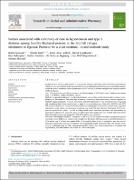| dc.contributor.author | Gyawali, Bishal | |
| dc.contributor.author | Dricile, Ratib | |
| dc.contributor.author | Dræbel, Tania Aase | |
| dc.contributor.author | Kyaddondo, David | |
| dc.contributor.author | Nakanjako, Rita | |
| dc.contributor.author | Nanfuka, Esther | |
| dc.contributor.author | Bygbjerg, Christian | |
| dc.contributor.author | Meyrowitsch, Dan Wolf | |
| dc.contributor.author | Skovdal, Morten | |
| dc.date.accessioned | 2023-04-04T14:05:19Z | |
| dc.date.available | 2023-04-04T14:05:19Z | |
| dc.date.issued | 2023-03-02 | |
| dc.identifier.citation | Gyawali, B., Dricile, R., Dræbel, T., Kyanddodo, D., Nakanjako, R., Nanfuka, E., ... & Skovdal, M. (2023). Factors associated with continuity of care in hypertension and type 2 diabetes among forcibly displaced persons in the Bidibidi refugee settlement in Uganda: Protocol for a cross-sectional, mixed-methods study. Research in Social and Administrative Pharmacy, 19(6) | en_US |
| dc.identifier.uri | http://dir.muni.ac.ug/xmlui/handle/20.500.12260/537 | |
| dc.description.abstract | Background: Non-communicable diseases in humanitarian settings are generally under-researched, particularly in Africa and have been called a neglected crisis. Little is known about factors affecting access to and (dis)continuity of care for chronic conditions, such as hypertension (HTN) and type 2 diabetes among forcibly displaced persons (FDPs) in Uganda.
Aim:To investigate factors affecting access to and (dis)continuity of HTN and/or type 2 diabetes care among FDPs in the Bidibidi refugee settlement, Uganda.
Methods: A sequential explanatory mixed-methods design incorporating methodological and investigator triangulation will be conducted. The study aims to employ a community-based participatory research approach to equitably engage community members, researchers, and other stakeholders in the research process, recognising and maximising their diverse contributions. In phase 1, the quantitative arm of the study, 960 FDPs with HTN and/or type 2 diabetes will be interviewed about their sociodemographic characteristics, health status, migration experiences, social capital, and awareness, treatment, and control of these diseases. Participants will be purposively recruited from phase 1 as well as village health teams, healthcare providers, and policymakers to participate in phase 2, the qualitative study, in order to gain more insight into how mobility and social factors affect (dis)continuity of care among FDPs with HTN and/or type 2 diabetes.
Discussion: The findings from phase 1 and phase 2 of the study will be integrated through a triangulation process to provide a more holistic and comprehensive insight into the factors affecting access to and (dis)continuity for HTN and/or type 2 diabetes care among FDPs. Understanding these factors is expected to pave the way for conceptualizing health-enabling environments and strengthening health systems for FDPs with chronic conditions. It is anticipated that the study will generate baseline evidence that might be beneficial in developing and implementing HTN and diabetes care models for FDPs in the region. | en_US |
| dc.description.sponsorship | Novo Nordisk Foundation (ref. NNF21OC0062473). | en_US |
| dc.language.iso | en | en_US |
| dc.publisher | Elsevier | en_US |
| dc.subject | Forcibly displaced persons | en_US |
| dc.subject | Hypertension | en_US |
| dc.subject | Type 2 diabetes | en_US |
| dc.subject | Mobility | en_US |
| dc.subject | Social capital | en_US |
| dc.subject | Refugees | en_US |
| dc.subject | Community-based participatory research | en_US |
| dc.subject | Mixed-methods study | en_US |
| dc.subject | Sub-saharan Africa | en_US |
| dc.title | Factors associated with continuity of care in hypertension and type 2 diabetes among forcibly displaced persons in the Bidibidi refugee settlement in Uganda: Protocol for a cross-sectional, mixed-methods study | en_US |
| dc.type | Article | en_US |

